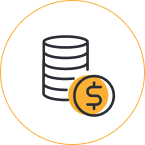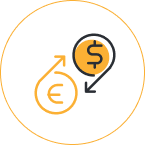the best features and benefits of mutual funds and stocks.
Why ETF?
ETFs offer greater diversification, do not require large investment, and eliminate the need to analyze individual stock. Returns tend to mirror underlying index and possible dividend yield.
Moreover, ETF has market maker(s) who provide liquidity by placing bid and offer. Investors may trade ETF by comparing the market price to real-time Indicative Net Asset Value (iNAV).
The SEC allows ETFs to replicate the performance of the following indices and assets:
- SEC-recognized securities indices
- SEC-approved securities or other financial instruments
- Foreign ETF
- Gold bullion recognized by Thai or international gold trading industry
The SEC allows ETFs to replicate the performance of the following indices and assets:
- SEC-recognized securities indices
- SEC-approved securities or other financial instruments
- Foreign ETF
- Gold bullion recognized by Thai or international gold trading industry
The following ETFs are listed on the Thai Stock Exchange:

Equity ETFs / Index ETFs
that seek to replicate the performance of domestic stock indices.

Sector ETF
that seek to replicate the performance of industry indices.

Foreign ETF
that seek to replicate the performance of foreign equity indices.

Bond ETF
that seek to replicate the performance of bond price indices.

Gold ETF
that seek to replicate the gold price.
How are ETFs different from stocks and Index Funds?
| ETF | Stocks | Index Funds | |
| Yield (Investment Purpose) | Tracks underlying index | Tracks single stock | Tracks underlying index |
| Trading on the stock market | Yes | Yes | Yes |
| Price | Real-Time | Real-Time | End-of-day |
| Minimum order (Board lot) | 100 units | 100 shares | No minimum unit. But minimum investment applies i.e. THB 1,000 |
| Trading Time | SET trading hours | SET trading hours | Specified by asset management companies |
| Transaction Fee | Brokerage Fee | Brokerage Fee | Management fees by asset management companies |
| Trading Method | Via brokers | Via brokers | Via asset management companies |
| Settlement Time | T+2 | T+2 | T+4 |
| Return | Capital Gains / Dividends | Capital Gains / Dividends | Capital Gains / Dividends |
| Capital Gain Tax | Exempted | Exempted | Exempted |
| Dividend Tax | 10% withholding tax | 10% withholding tax (qualified for a tax credit) | 10% withholding tax |
FAQ
- Capital gains when investors sell their ETF shares at a higher price than when they were bought
- ETFs that invests in equities may receive dividend when fund manager distributes
- Market risk from declining value of the ETF's asset holding, which affects the ETF's NAV
- Tracking error risk, or the difference between an ETF's and its underlying assets' returns, may significant impact an investor's returns.
- ETF price fluctuation risk as a result of market demand and supply
- Liquidity risk caused by market demand and supply
- Currency risk if the ETF invests in foreign assets
|
|
Dividends |
Capital gains |
|
Individual investor |
10% withholding tax | Exempted |
| Juristic investor | Listed companies are eligible for tax-exempt | Corporate income tax |
How can I find out more about ETFs ?


